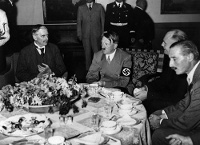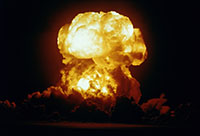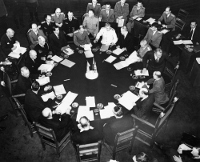


Are you sure you want to reset the form?
Your mail has been sent successfully
Are you sure you want to remove the alert?
Your session is about to expire! You will be signed out in
Do you wish to stay signed in?
➜ What went wrong at Gallipoli in 1915?
➜ Did people agree with Churchill's stand on appeasement?
➜ Why did the Allies find it hard to agree about a Second Front in the Second World War?
➜ Was Churchill really worried about the Battle of the Atlantic? And if so, why?
➜ Could Britain have done more to help the Jews in the Second World War?
➜ Did the League of Nations matter in the 1920s?
➜ What was the significance of Pearl Harbor?
➜ Did nuclear weapons help to make the world safer between 1945 and 1951?
➜ Churchill and the Cold War: Why did Churchill make his famous ‘Iron Curtain’ speech in 1946?
➜ Who deserves the credit for developing the tank?
➜ How united were the Big Three at the Yalta Conference in 1945?
➜ Was the Dunkirk evacuation a triumph or a disaster?
➜ Why did British politicians see the need for welfare reforms in the early 1900s?
➜ Was Britain divided about Indian independence, 1930-47?
➜ Did the Suffragettes help or harm the cause of women’s suffrage?
➜ How far did attitudes to women change after they secured the vote in 1918?
➜ What does the Korean War reveal about the ‘special relationship’?
➜ Just how special was the ‘special relationship’ in the Second World War? (Part 1, 1939–41)
➜ Just how special was the 'special relationship' in the Second World War? (Part 2, 1942-44)
Churchill Archive for Schools offers teaching and learning resources designed to support teachers and engage students of history at secondary level. The resource also provides a gateway into the complete Churchill Archive (available free to schools following registration). It covers topics that are central to:
Teachers can use a range of investigations to explore the educational potential of the Archive. Each one sets an overarching enquiry question for the students to consider, accompanied by a selection of documents from the Archive, as well as short essay introductions to each topic, teachers' notes and extra questions to help understand each primary source.
The enquiries have been split into four different categories:
To explore the investigations, browse the Table of Contents on the left or scroll down for descriptions of the content.

When the First World War broke out in July 1914 the general feeling was that it would be over by the end of that year. However, as 1914 turned into 1915 it was clear this wasn’t the case. On the Western Front in particular, the fighting had ground to a stalemate, and the casualties continued to rise.

The 1930s were a dark time in the world’s history. The worldwide economic depression caused widespread hardship and misery around the world. It also led to the rise of aggressive regimes in Japan, Italy and Germany.

During the Second World War in Europe the majority of the fighting took place on the Eastern Front, between Germany and her allies and the forces of the Soviet Union. Germany invaded the USSR in 1941 and a bitter struggle followed which ended in Berlin in 1945.

The Battle of the Atlantic ran from September 1939 right through until May 1945. Supplies of food and essential war materials from the rest of the world were essential in order to keep Britain’s war effort alive. As in the First World War, Germany used all-out submarine warfare in an attempt to starve Britain into submission.

Most people are aware of the horrific fate suffered by around 6 million Jews and other persecuted groups in the Nazi genocide during the Second World War. Debate has swung back and forth about what the Allies knew about what was happening and also whether they could have taken more actions than they did.

The League does not enjoy a favourable historical reputation. However, this may not be entirely fair. It has been criticised for failing to stop aggressive regimes in Japan, Italy and Germany in the 1930s. This is justifiable to some extent, but have the failures of the 1930s obscured the work of the League in the 1920s?

On 7 December 1941, over 350 Japanese aircraft attacked the US naval base in Pearl Harbor, Hawaii. This was a devastating shock to the US, but was it more than just an attack on US naval forces?

The development of the atomic bomb during the Second World War ushered in tremendous change on the world stage. To many, it seemed that the development of nuclear weapons made the post-war world a more dangerous place, although many historians now argue that the opposite was in fact true.

Most historians would agree that a key event in the emerging Cold War was Winston Churchill’s ‘Iron curtain’ speech. This speech was hugely controversial and Josef Stalin wrote a direct response to it. Churchill must have known the likely reaction from the world, so why did he write it?

The First World War began in August 1914, and by the autumn of that year it had reached a stalemate. Many new weapons were eventually developed and used on the Western Front, but perhaps the most effective, at least from late 1917, was the tank. The success of the tank led mainly to try to claim the credit for its development and introduction. So who can we say deserves most credit for developing the tank, if anyone?

In the later nineteenth and early twentieth centuries, an important change in attitude was taking place in Britain with respect to the lives and conditions of the poorest in society. In the past, the poor had generally been blamed for their own problems. But attitudes began to change.

By the 1930s Britain had been ruling India for over a hundred and fifty years in one form or another. Most of the subcontinent was ruled directly by British officials while other areas were ruled by princes who were allied to the British. But British rule hadn’t gone unopposed.

In the later nineteenth and early twentieth centuries one of the most high profile political questions concerned whether or not women should get the vote. Women had been campaigning for the vote from the mid-1800s or even earlier.

The Representation of the People Act in 1918 gave some women over 30 the vote in British General Elections for the first time. This is often recognised as a crucial step towards bringing equality between the sexes in the United Kingdom. However, how far did the act go in actually changing perceptions of women?

In 1950, war broke out between North and South Korea. During the Second World War, Korea had been ruled by the Japanese. When the Japanese were defeated in 1945 the northern half of Korea became Communist, closely linked to the USSR and later, to Communist China.

The US and the UK have often been said to have a special relationship based on a common language, religious and political beliefs and a close trading relationship. They’ve also been military allies in the First and Second World Wars. But what was the real nature of this relationship during the Second World War?

Would the entry of the USA into the war change the ‘special relationship’ between the USA and the UK? Could it be an equal and friendly partnership? Would the larger, richer and more powerful USA become the dominant partner? The sources in this investigation will help you consider these and many other important questions.

To most people today this might seem like a very strange question. Churchill’s speeches during the Second World War are seen as almost legendary, inspiring the nation to fight Nazism and achieve final victory.